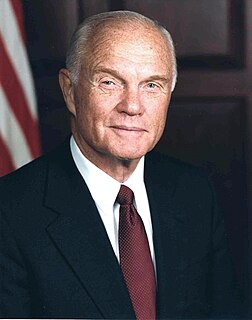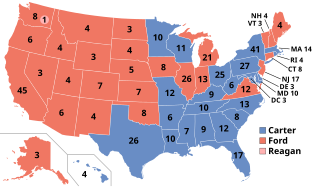
The 1976 United States presidential election was the 48th quadrennial presidential election. It was held on Tuesday, November 2, 1976. Democrat Jimmy Carter of Georgia defeated incumbent Republican President Gerald Ford from Michigan. Carter's win represented the lone Democratic victory in a presidential election held between 1968 and 1988.

The 1984 United States presidential election was the 50th quadrennial presidential election. It was held on Tuesday, November 6, 1984. Incumbent Republican President Ronald Reagan defeated former Vice President Walter Mondale, the Democratic candidate.

The 1984 National Convention of the U.S. Democratic Party was held at the Moscone Center in San Francisco, California from July 16 to July 19, 1984, to select candidates for the 1984 United States presidential election. Former Vice President Walter Mondale was nominated for President and Representative Geraldine Ferraro of New York was nominated for Vice President. Ferraro became the first woman to be nominated by either major party for the Presidency or Vice-Presidency. In another first, the 1984 Democratic Convention was chaired by the female governor of Kentucky, Martha Layne Collins. The Democratic National Committee Chairman at the time, Charles T. Manatt, led the convention.
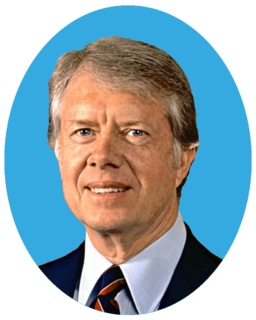
The 1980 National Convention of the U.S. Democratic Party nominated President Jimmy Carter and Vice President Walter Mondale for reelection. The convention was held in Madison Square Garden in New York City from August 11 to August 14, 1980.

The 1984 Democratic presidential primaries were the selection process by which voters of the Democratic Party chose its nominee for President of the United States in the 1984 U.S. presidential election. Former Vice President Walter Mondale was selected as the nominee through a series of primary elections and caucuses culminating in the 1984 Democratic National Convention held from July 16 to July 19, 1984, in San Francisco, California.

The 1984 United States elections was held on November 6, and elected the members of the 99th United States Congress. The Republicans won a landslide victory in the presidential election, picked up seats in the House, and successfully defended their Senate majority.

The 1976 United States presidential election in Massachusetts took place on November 2, 1976, as part of the 1976 United States presidential election, which was held throughout all 50 states and D.C. Voters chose 14 representatives, or electors to the Electoral College, who voted for president and vice president.

The 1984 United States presidential election in Washington took place on November 6, 1984. All 50 states and the District of Columbia, were part of the 1984 United States presidential election. Washington voters chose 10 electors to the Electoral College, which selected the president and vice president of the United States.

The 1984 United States presidential election in Rhode Island took place on November 6, 1984. All 50 states and the District of Columbia, were part of the 1984 United States presidential election. Rhode Island voters chose 4 electors to the Electoral College, which selected the president and vice president of the United States.

The 1976 United States presidential election in Minnesota took place on November 2, 1976, in Minnesota as part of the 1976 United States presidential election.
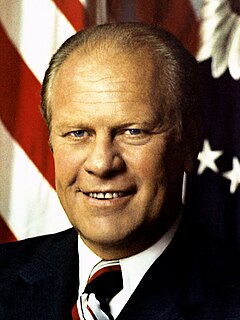
The 1976 United States presidential election in New Hampshire took place on November 2, 1976, as part of the 1976 United States presidential election, which was held throughout all 50 states and D.C. Voters chose 4 representatives, or electors to the Electoral College, who voted for president and vice president.

The 1976 United States presidential election in Connecticut took place on November 2, 1976. All 50 states and The District of Columbia, were part of the 1976 United States presidential election. Connecticut voters chose eight electors to the Electoral College, who voted for president and vice president.
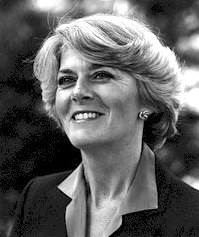
This article lists those who were potential candidates for the Democratic nomination for Vice President of the United States in the 1984 election. Former Vice President Walter Mondale won the 1984 Democratic nomination for President of the United States, and chose New York Representative Geraldine Ferraro as his running mate. Ferraro was the first woman to be a part of a national ticket for a major party. Mondale chose Ferraro in hopes of energizing the base and winning the votes of women, but also because he viewed her as a solid legislator who had won the approval of Speaker Tip O'Neill. John R. Reilly, an attorney and a senior adviser to Mondale, managed the search for a running mate. Mondale seriously considered his major rival for the 1984 presidential nomination, Senator Gary Hart, but Mondale refused to consider a second rival, Jesse Jackson, on the grounds that the differences between their policies were too great. The Mondale-Ferraro ticket ultimately lost to the Reagan-Bush ticket.

This article lists those who were potential candidates for the Democratic nomination for Vice President of the United States in the 1972 election. Coming into the 1972 Democratic National Convention, South Dakota Senator George McGovern had the delegate lead, but did not have the presidential nomination locked up. After winning the Democratic nomination for president on July 13, McGovern looked for a running mate. McGovern's first choice for vice president was Ted Kennedy, but Kennedy refused to join the ticket; Minnesota Senator Walter Mondale, Wisconsin Senator Gaylord Nelson, and Connecticut Senator Abraham A. Ribicoff also declined. McGovern offered the position to Missouri Senator Thomas Eagleton, who appealed to labor groups and Catholics, two groups that McGovern had alienated during the primary campaign. The ticket of McGovern and Eagleton was nominated by the 1972 Democratic National Convention. Following the convention, it was revealed that Eagleton had received treatment for depression. Though McGovern considered keeping Eagleton on the ticket, he ultimately chose to replace Eagleton with former Ambassador Sargent Shriver. The McGovern-Shriver ticket lost the presidential election to the Nixon-Agnew ticket. After the controversy surrounding Eagleton, future campaigns spent much more time vetting vice presidential candidates.

This article lists those who were potential candidates for the Republican nomination for Vice President of the United States in the 1980 election. Former California Governor Ronald Reagan won the 1980 Republican nomination for President of the United States, and chose former Texas Representative George H. W. Bush as his running mate. Reagan had considered naming former president Gerald Ford as his running mate, but after Ford and Reagan were unable to agree to be on the same ticket, Reagan turned to Bush, his primary rival for the 1980 Republican nomination. Though Bush had criticized Reagan's policies, Reagan chose Bush to help unify the party, and Bush agreed to be on the ticket and to support Reagan's platform. The Reagan-Bush ticket defeated the incumbent Democratic Carter-Mondale ticket, and in 1984 won re-election defeating the Mondale-Ferraro ticket. Bush was later elected president in his own right in 1988.

The 1976 United States presidential election in Arkansas took place on November 2, 1976, as part of the wider United States presidential election of 1976. Voters chose six electors to represent them in the Electoral College.
The 1984 presidential campaign of Walter Mondale, a former Minnesota senator and Vice President of the United States, began on February 21, 1983, when Mondale announced that he was running for president in a speech at the Minnesota State Capitol. Mondale won the Democratic Party's presidential nomination after convincing Frank Lautenberg, a previously unpledged party delegate, to support him. Lautenberg's vote gave Mondale the 1,967 delegate votes needed to become the Democratic Party's nominee. Mondale lost the general election, held on November 6, 1984, to incumbent Republican President Ronald Reagan in a landslide.





